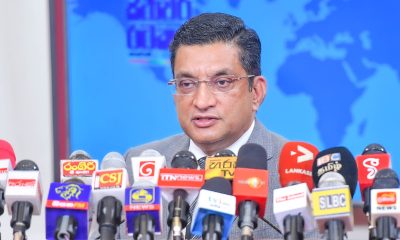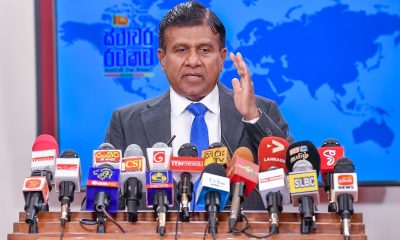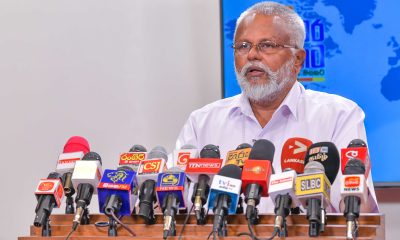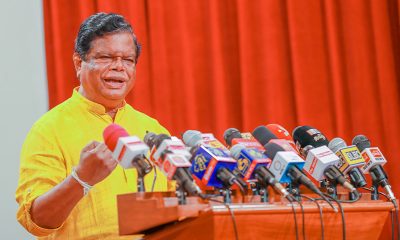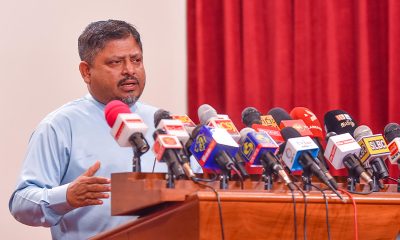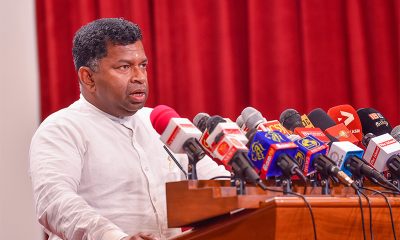Latest News
Government does not posses a buffer stock of rice or paddy at the moment – Minister of Agriculture
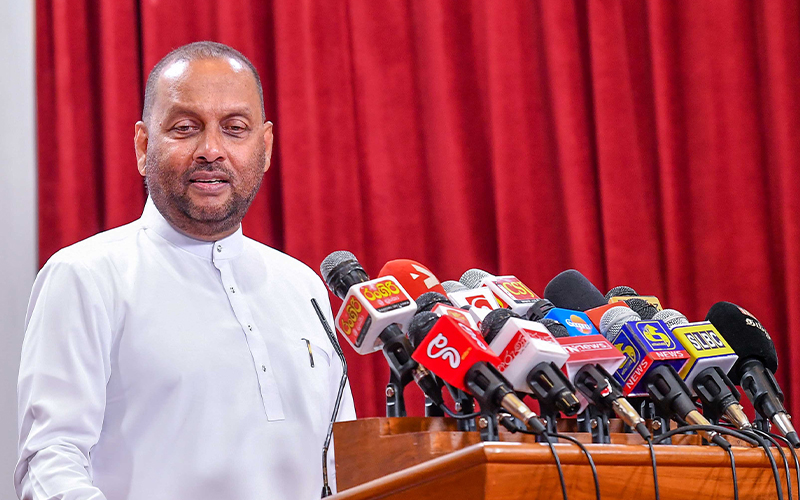
Minister of Agriculture and Plantation Industries Mahinda Amaraweera joining a press briefing held at the Presidential Media Centre (PMC) on the theme ‘Collective Path to a Stable Country’ today (29) announced that the country is now self-sufficient in rice production but in reply to a query by The Island admitted that the government does not posses a buffer stock of either paddy or rice at the moment.
The Minister admitted that it is imperative that the government maintains a buffer stock of rice or paddy to counter the monopoly the millers have on the trade and added that he would bring the matter up at the cabinet meeting.
Minister Amaraweera said that there was no necessity for Sri Lanka to import any rice in 2024 and that the country may export the surplus or produce more rice based products. He said that in 2023 only ‘Basmathi’ and a small quantity of ‘Keeri Samba’ was imported. He reiterated that the Keeri Samba was imported to prevent the millers from profiting by creating an artificial shortage.
Latest News
US, Israel launch attack on Iran, explosions in downtown Tehran
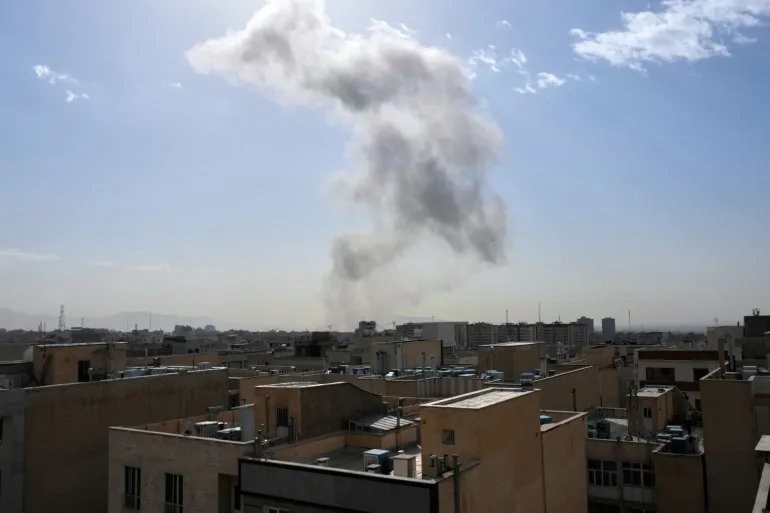
The United States and Israel have launched an attack on Iran, with explosions heard and seen across Tehran.
Several missiles have struck University Street and the Jomhouri area in Tehran, Fars news agency reported. Smoke was seen rising in the city, according to an Al Jazeera correspondent on the ground.
Israel’s Defence Minister Israel Katz claimed Israel launched the missile attack in order to “remove threats to the State of Israel”.
A United States official told Al Jazeera that the attacks were carried out as a joint military operation between Israel and the US, which has assembled a vast fleet of fighter jets and warships in the region to try to pressure Iran into a deal over its nuclear programme.
The Associated Press news agency reported that the strike in Iran’s capital happened near offices of Supreme Leader Ayatollah Ali Khamenei. According to an official cited by Reuters, Khamenei is not in Tehran and has been transferred to a secure location.
Iran’s semi-official Tasnim news agency reported that explosions also occurred in Tehran’s northern Seyyed Khandan area.
As sirens sounded and a state of emergency declared in Israel, the Israeli military said it had issued a “proactive alert to prepare the public for the possibility of missiles being launched toward the state of Israel.”
Israel’s Airports Authority announced airspace had been closed to all civilian flights and urged the public not to come to the airport.
Meanwhile, the US Embassy in Qatar implemented shelter-in-place for all personnel, recommending that all of its citizens to do the same until further notice.
Reuters cited an Israeli deence official as saying the attacks had been planned for months and the launch date was decided weeks ago.
[Aljazeera]
Latest News
At least 11 killed after military plane carrying banknotes crashes in Bolivia
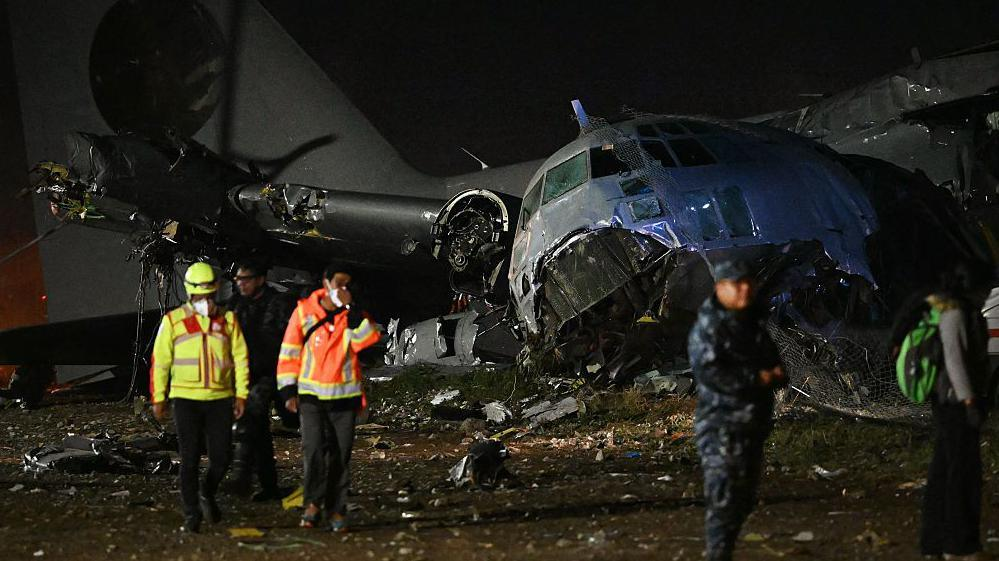
At least 11 people have been killed after a Bolivian air force cargo plane crashed in the western city of El Alto, according to media reports quoting firefighters.
The incident happened at 18:15 local time (22:15 GMT) on Friday as the plane was arriving at El Alto’s airport from the city of Santa Cruz, aviation officials said. It reportedly skidded off the runway and hit nearby vehicles.
The defence ministry later confirmed its C-130 Hercules was involved and that it had been transporting banknotes to the Central Bank of Bolivia. It did not say how many people were on board, and gave no casualty numbers.
Police fired tear gas to disperse crowds allegedly trying to take the scattered banknotes.
Video footage showed people running away from the tear gas and police officers, some holding shields, forming a line. Some in the crowds are seen throwing rocks at police.
The crashed plane can be seen on the ground and badly damaged vehicles can be seen in other videos.
“I want to make it clear to those who are trying to take money from the plane involved in this tragedy that this money has no legal value since it has not been issued by the Central Bank and does not have a serial number, and that attempting to use this money is a crime,” the Minister of Defence, Marcelo Salinas, said.
“We also ask all those who are engaging in acts of vandalism in this area to refrain from doing so and to respect the mourning and grief we are experiencing at this difficult time.”
Firefighters working at the crash site said that at least 20 people were injured, local media reported.
El Alto International Airport was temporarily closed following the crash.
“My sister told me that she was in the car when the plane crashed. The plane’s tire fell on the car, and my sister was injured because the impact of the tire hit her on the head, so we rushed her to the hospital,” a man told the Reuters news agency.
It was not immediately clear what caused the crash, but some witnesses said the weather at the time was treacherous.
“A heavy hailstorm” was falling and “there was lightning” when the plane went down,” a woman whose car was struck by the aircraft wreckage told the AFP news agency.
An investigation into the incident is under way.
[BBC]
Latest News
A ‘delicate’ balance for Canada and a ‘win-win’ for Modi as Carney visits India
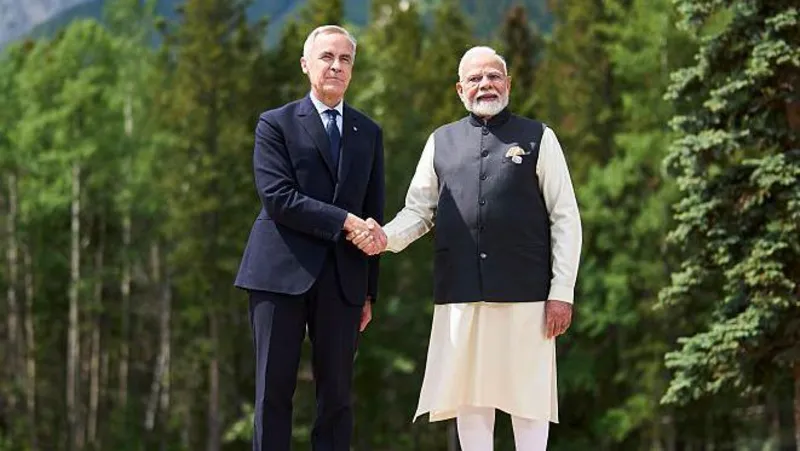
Canadian Prime Minister Mark Carney is in India for a pivotal trip aimed at repairing ties with the world’s largest democracy, as both countries seek to reduce their trade reliance on the US.
Carney began his visit in Mumbai, where he is meeting with business leaders. He will then travel to New Delhi for talks with Prime Minister Narendra Modi.
The trip marks a remarkable turnaround in relations, which had collapsed when Canada accused India of carrying out an extrajudicial killing of a Canadian Sikh separatist on Canadian soil — an allegation India strongly denied.
Both sides now appear ready to move forward.
Here’s what has changed, and what each country hopes to gain as Carney’s trip gets underway.
For Carney, this trip is strictly business, aligned with his broader goal of diversifying Canada’s trade partners to reduce economic dependence on the US.
A big focus will be making progress on a comprehensive free trade agreement with India, which has been discussed on-and-off for the last 15 years.
The latest derailment in trade talks occurred after former Prime Minister Justin Trudeau made a bombshell public accusation against India in 2023, alleging it was involved in the killing of Hardeep Singh Nijjar, a Sikh separatist, who was gunned down in British Columbia. Four men were later charged in his death, and their case is still before the courts.
India has repeatedly denied any involvement.
Now faced with US tariffs, and under Carney’s more “pragmatic” approach to foreign policy, Ottawa is repairing ties with Delhi.
Still, the allegations remain a point of contention for some members of Canada’s Sikh community, who say they continue to be targeted by India through transnational repression, and have criticised Carney for prioritising economic interests over their safety.
It is a situation that will require “delicate handling”, Vina Nadjibulla, vice-president of the Asia Pacific Foundation of Canada, told the BBC.
Asked repeatedly about these concerns, Canadian officials told reporters ahead of Carney’s trip that the two countries are engaged in “robust” discussions on national security and foreign interference.
They added that Canada does not believe the Indian government is currently linked to any violent crimes or threats on Canadian soil, and that they “probably would not be taking this trip” if that were the case.
Not everyone is convinced. Sukh Dhaliwal, an MP from Carney’s Liberal party, told Canadian media that the claim of India no longer being a threat is “disconnected from the reality”.
Canada has made several diplomatic overtures to India since Carney took office last year, beginning with inviting Modi to the G7 summit in Kananaskis, Alberta last summer.
That was followed by a series of meetings between Foreign Minister Anita Anand and her Indian counterpart, S Jaishankar, as well as a visit to Ottawa last month by India’s national security advisor, Ajit Doval.
Carney’s itinerary in India offers some insight into his priorities.
He will stop only in Mumbai, India’s financial hub, to meet with business leaders, and New Delhi, where he will sit down with Prime Minister Modi on Monday.
Unlike Trudeau, Carney will not be visiting cultural sites like the Taj Mahal. Nor will he travel to Punjab, the home state of many of India’s Sikhs, which was a stop for both Trudeau and another former prime minister, Stephen Harper.
Those stops were often seen as nods to Canada’s large Indo-Canadian and Sikh communities. Their omission signals that, this time, Canada’s focus is squarely on trade.
On the agenda will be discussions around energy, technology, artificial intelligence and defence, Carney’s office has said, as well as attracting top talent to Canada.
Carney and Modi are also likely to discuss tariff policies enacted by President Donald Trump, which have had an impact on both their economies.
Heading into the trip, Canada remains the only G7 country that has not reached a preferential trade agreement with India. Nadjibulla of the Asia Pacific Foundation of Canada said that fact “adds urgency” for Carney.
“There is a window of opportunity, and it needs to be seized,” Nadjibulla said.
It was in 2024, not too long ago, that both countries were openly trading barbs, suspending visa services and expelling diplomats.
But a lot has changed since then.
India is now more open for business, which is evident from a flurry of free trade deals that it has signed recently.
Then there is Trump, who has targeted both India and Canada with steep tariffs.
In Carney’s own words, the world is “in the midst of a rupture, not a transition” and “if you are not at the table, you are on the menu”.
For India’s Prime Minister Modi, a reset with Canada is a win-win situation.
Domestically, the visit will boost Modi’s image as a leader who refused to come under pressure from Canada.
Ottawa has already said it believes India is not currently linked to violent crimes or threats on Canadian soil.
But more broadly, it is the trade potential between the two countries that will drive the outcome of this visit.
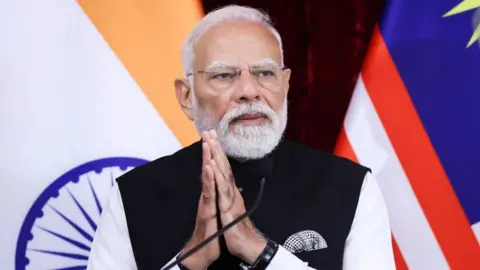
[BBC]
-

 Features6 days ago
Features6 days agoWhy does the state threaten Its people with yet another anti-terror law?
-

 Features6 days ago
Features6 days agoReconciliation, Mood of the Nation and the NPP Government
-

 Features6 days ago
Features6 days agoVictor Melder turns 90: Railwayman and bibliophile extraordinary
-

 Features5 days ago
Features5 days agoLOVEABLE BUT LETHAL: When four-legged stars remind us of a silent killer
-

 Features6 days ago
Features6 days agoVictor, the Friend of the Foreign Press
-

 Business5 days ago
Business5 days agoSeeing is believing – the silent scale behind SriLankan’s ground operation
-

 Business5 days ago
Business5 days agoBathiya & Santhush make a strategic bet on Colombo
-

 Features6 days ago
Features6 days agoBarking up the wrong tree


